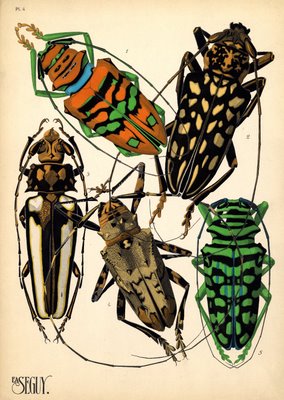
1. Sternotomis Imperialis. Guinée; 2. Sternotomis cornutus. Madagascar; 3. Callipogon Lemoinei. Perou; 4. Palimna annulata. Cochinchine; 5. Sternodonta pulchra. Sénégal
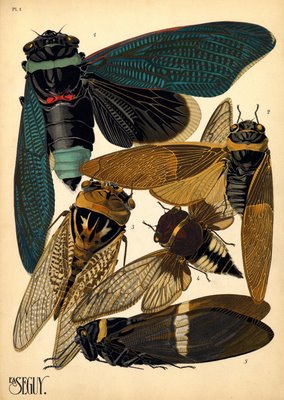
1. Tacua speciosa. Indes; 2. Polyneura ducalis. Indes Or.; 3. Cicada saccata. Australie; 4. Cicada fascialis. Siam; 5. Tozena melanoptera. Indes Or.

1. Scolia procer. Asie Tropicale; 2. Eulema dimidiata. Brésil; 3. Stilbum splendidum. Cosmpolite; 4. Bombus lapidarius incertus. Arménie; 5. Xylocopa tenuiscapa. Asie Tropicale

1. Rhabdotis sobrins. Nubie; 2. Gnathocera varians. Sénégal; 3. Coelorhina guttata. Guinée; 4. Euchrea celestis. Madagascar; 5. Gymnetis Touchardii. Vénézuela
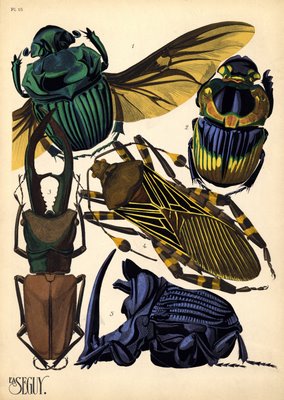
1. Phaneus conspicillatus. Brésil; 2. Phanoeus imperator. Argentine; 3. Cyclommatus tarandus. Bornéo; 4. Pachilis gigas. Mexique; 5. Phanoeus ensifer. Guyane

1. Pepsis limbata. Amérique du Sud; 2. Chlorion lobatum. Asie Tropicale; 3. Vespa crabro. Europe; 4. Monedula chilensis. Chili; 5. Pepsis errans. Amérique du Sud

1. Nemopistha imperatrix. Afrique Oc.; 2. Tomatares citrinus. Afrique Austral.; 3. Neurolasis chinesis. Asie; 4. Aeschna Cyanéa. Europe; 5. Mnais earnshawi. Indochine
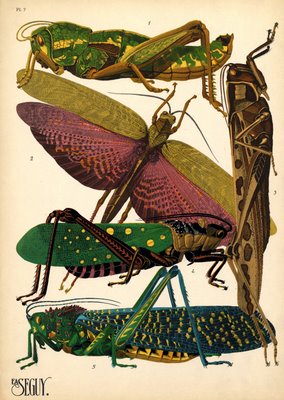
1. Pamphagus elephas. Algérie; 2. Tropidacris dux. Amérique du Sud; 3. Cyrtacantacris tartarica. Asie; 4. Aularches miliaris. Asie; 5. Phymateus saxosus. Madagascar
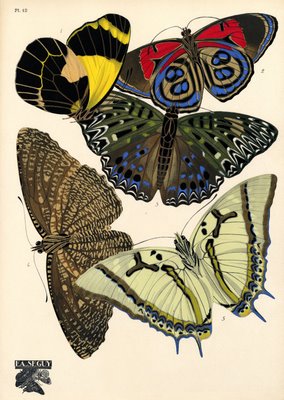
1. Delias neagra. Nouvelle Guinée; 2. Catagramma kolyma. Amazone; 3. Dichorragia nesimachus. Sikkim; 4. Elymnias malelas. Inde; 5. Eulepis eudamippus. Indo Malaisie
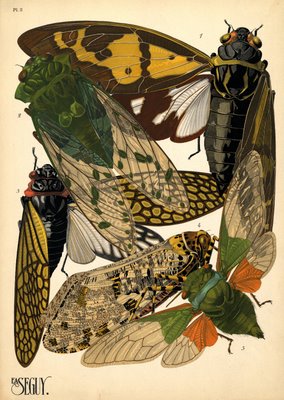
1. Goeana festiva. Indes; 2. Zammara tympanum. Amérique du Sud; 3. Goeana ochracea. Indes; 4. Phenax variegata. Brésil; 5. Hemisciera maculipennis. Amazone

1. Euploea rhadamanthus. Inde; 2. Troïdes brookeana. Bornéo; 3. Erasmia pulchella. Sikkim; 4. Papilio antiphates. Inde; 5. Pyrameis myrinna. Equateur
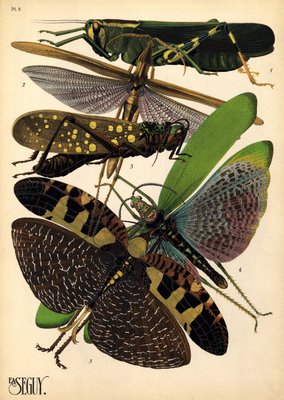
1. Horaeocerus nigricornis. Madagascar; 2. Acrida miniata. Algérie; 3. Aularches miliaris. Asie; 4. Phymateus Brunneri. Afrique Tropicale; 5. Acanthodis imperialis. Asie

1. Arachnis dilecta. Mexique; 2. Hypsa borbonica. Congo; 3. Hypsa dominia. Chine; 4. Cerace stipatana. Chine; 5. Callimorpha hera. Europe; 6. Callimorpha equitalis. Chine

1. Calopterix. Australie; 2. Diphlebia nymphoides. Australie; 3. Palpares imperator. Madagascar; 4. Calopterix. Asie; 5. Nemoptera sinuata. Région Méditerran.

1. Charaxes zingha. Congo; 2. Papilio blumei. Celebes; 3. Argynnis childrenae. Chine; 4. Papilio tyndereus. Congo; 5. Charaxes cognatus. Celebes

1. Batocera Hector. Java; 2. Callichroma suturalis. Guyane; 3. Steirastoma lacerta. Brésil; 4. Rosalia alpina. Europe; 5. Batocera Wallacei. Nouvelle Guinée

1. Amaurodes Passerinii. Mozambique; 2. Inca clathratus. Pérou; 3. Histrionica euchroea. Madagascar; 4. Cerathorhina derbyana. Mozambique. 5. Goliathus giganteus. Cameroun
[definitely click on these images: they are large-ish and much more spectacular at full size]
E.A. Séguy was active as a designer and artist in France in the first three decades of the 20th century. Of that much I am confident. But there is strangely very little biographical material about him online. Much of what is around is copied from site to site (whether university or poster shop) and I don't think all of it is trustworthy. Part of the problem comes from the fact that there was another E.A. Séguy (Eugene Alain - names they both 'might' share too) active in Paris at the same time - but he was an entomologist, strangely enough. One of them died in 1989 so it's likely these prints remain under copyright.
In any event, Séguy the artist is best remembered for a couple of series of prints he produced in the 1920s - 'Papillons' and 'Insectes' - both of which are featured above. The wonderfully lush and vibrant colours we see come from the multiple-stencil technique of pochoir printing, usually associated with the Art Nouveau and Art Deco movements.
Séguy consulted textbooks in an effort to bring a scientific level of accuracy to his work and included the species names and geographic origins that I've copied in as captions. His other work - some 11 albums - abstract his natural history penchant into the world of decorative design in which he constructed decals and motifs from insects, crystals, wings and similar.
Last year North Carolina State University purchased 'Papillons' and we are fortunate indeed that they digitized both that and 'Insectes' - I knew about the large stash of Séguy work at NYPL but the quality and size of their images is mediocre at best. NCSU definitely have the best images online but unfortunately they are all obstructively caged inside the Luna Insight browser architecture. It's worth the trouble in my opinion: these prints are fantastic seen at high magnification, a testament both to the exceptional quality of the pochoir process and to Séguy's artistic abilities.
- George Glazer Gallery.
- 'Vibrant Visions': Pochoir Prints in the Cooper-Hewitt National Design Museum Library.
Ewwww....they look so real. LOL
ReplyDeleteThese are absolutely exquisite.
ReplyDeleteThank you for this further compelling demonstration of your good taste.
5 Stars!
wow I've never seen such beatiful drawinf of insects,it helps me now so much,I'm just making sculptures of insects.Such a shame,that NCsU's digitalizes version can't be accessed by me :(
ReplyDeletei just went through the whole nypl collection of his stuff (mostly in thumbs) and truly came away with a new respect. i have found as you did no bio stuff; also, my local libraries have free loan accessibility with like 50 university libraries and there are no biographies/books about him in any of them either. i guess i'll have to look at some dover books and see what they have. thanks for additional possible sources, though.
ReplyDeleteI love this so much!!!
ReplyDeletebeautiful;;;
ReplyDeleteHis daughter is still alive.
ReplyDeleteUSEI TODAS ESTAS IMAGENS PRA MOSTRAR AOS MEUS SOBRINHOS OS INSETOS...AMO AS IMAGENS DOS INSETOS, POIS SÃO CRIATURAS ANTIGUISSIMAS...
ReplyDelete